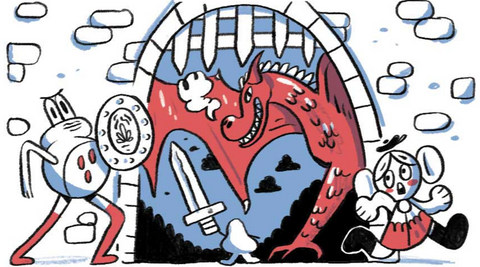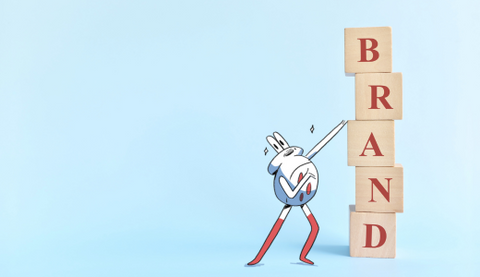Title writing.
It’s not as easy as you might think.
Take this article, for example. Can we really call an article about writing catchy titles “How to write a catchy title”? It’s hardly… well, catchy.
Fortunately for you, your presentation title doesn’t need to be anywhere near as functional. You don’t have to be easy to find when people google advice. You’ve got (almost) free rein to come up with something truly catchy.
That comes with its own challenges too, of course.
So I’ve gathered together some top tips from Steve Rawling of Storyteller Tactics, and the internet at large.
Let’s get to work and write a catchy presentation title – with examples to help.
Why do you need to write a catchy presentation title?
For optional-attendance events, your presentation title needs to capture the attention of your audience enough for them to consider attending. It doesn’t matter how good anything else you have prepared is, if they don’t like the title, they’ll never get to see any of that stuff.
Of course, for many work-related presentations, your audience is pretty much guaranteed. It’s a work thing, so the people who need to be there, will be. Even then, a catchy title is important to set the tone of the session. And you don’t want that tone to be boring, do you?
We want attendees who feel anticipation, not dread or (worse) indifference.
That’s the Why; here are some Hows.
Techniques for writing catchy presentation titles
Buckle up, we’re starting with… worms!
Mindworms
Our community recently explored Mindworms in a live session to discover why some ideas stick in our minds and our memories while others fade into obscurity. Here are some key points you can apply to writing titles. If you include a handful of these things, you’re on the right track:
- Simplicity: is it easy to understand and repeat?
- Unexpectedness: is it surprising in some way?
- Concreteness: does it paint a clear picture?
- Emotionality: does it evoke hopes and/or fears or engage our sense of identity?
- Storyness: does it describe some sort of causal chain (cause and effect)?
- Sensory: does it include elements like touch, smell or taste?
- Repetitiveness: are any elements or words repeated to help it stick?
- Rhyme: do you have any rhyming words that will help people recall it easily?
- Metaphors: can you use a metaphor to simplify the message?
I’d also consider adding alliteration and humour to this list; the latter particularly if it’s an internal-facing presentation with a known audience.
For example, you might not be particularly enthused about joining a session called: ‘First-quarter Financial Report on Product X’ (although it does use concreteness in mentioning ‘first quarter’ and is easy to understand).
You might be slightly more enthusiastic about ‘Breakeven and beyond; Project X’s first quarter’, and positively excited about ‘Product X; the cash cow whose milk smells like success’. The first employs hope ('... and beyond’), which is an emotion, as well as being simple and concrete. The second uses a metaphor (cow/milk), sensory words (smell), emotions are evoked (success) and is unexpected. (Perhaps too unexpected, but it takes all kinds!)
Story approaches for presentation titles
Every good story needs a title, so it’s no surprise that Steve Rawling, Author of Storyteller Tactics, has also covered this topic.
We can start off with the Secrets and Puzzles Storyteller Tactic - a fantastic way to format your presentation, by the way. But even if you don’t use it throughout your talk, you can use it in your title. People love secrets and puzzles. And you can create the sense of a secret about to be shared, or a puzzle to be solved, by using specific ‘keywords’:
- Secret, confidential, insider, exclusive, hidden, restricted, banned, untold, forgotten.
- Puzzle, riddle, odd, bizarre, unexpected, ironic, paradox, peculiar, mystery.
But remember - and this is important - if you promise a secret or something puzzling, you must deliver. As Steve says, the use of these words without any type of secret is just clickbait.
Presentation titles – examples
Let’s try the exercise again. Can you think of a better way to phrase this title? ‘Exit interview data: 2022 learnings’.
The presentation sounds like it’ll talk through the findings of HR’s interviews with team members who have left since the start of the year. This is prime material for a secret-inspired headline (what secrets did the interviews hold?) or a puzzle (how can the data be used to inspire change?).
Something like “Famous last words; what secrets do 2022’s exit interviews hold?” or “Unexpected push factors: can 2022’s exit interviews catalyse change?”. Both of these are concrete (giving a specific time frame), simple enough for the specialised audience to understand and promise something secretive or surprising.
Another example. This time, imagine you're presenting a new digital product to the rest of your large organisation. A functional presentation title would be 'Launching Vibe25: a breakthrough product'. Boring.
Try 'Sneak peek at the next big thing: Vibe25'. Or dive deep into what's so cool about it. Maybe it's a sentiment analysis tool: 'Turning customer's frowns upside down with Vibe25'. It doesn't explicitly mention a puzzle, but it's sure to have people puzzling about how it might do that.
Other approaches
If there doesn’t seem to be an appropriate secret or puzzle, there are lots of other Storyteller Tactics cards you can use to inspire an intriguing title. For example, Order & Chaos, Good & Evil and Curious Tales.
Another great Storyteller Tactic to use when searching for the perfect title is That’s Funny. It has you pick out something about your presentation/story that is a bit odd and makes you go “Hmm, that’s funny…”, or perhaps a person that is acting unusually. Something a little bit out of the ordinary (and unexpected) is a good way to reel people in. And talking of reeling people in…
Finally, Story Hooks is a fantastic tool. Steve looked at 1,000 TED talks to look for story hooks in their titles. He found a tonne of useful approaches: questions, surprises, ironies, relatability, superlatives and of course - knowledge. The promise that you will impart your hard-earned experience, in simple language, so that others may benefit from it, is a powerful one.
Other title-writing tricks to try
The internet is full of suggestions, some great and some utterly absurd. This list sticks to the former category! Pick a couple that are relevant to your presentation and give them a whirl.
- Use your title to create a knowledge vacuum. Is the content of your talk going to change something big? "This could change the way we talk to customers forever" - it lets people know that they'll be missing out on something important if they don't pay attention.
- Look for inspiration elsewhere. Probably not in your own calendar - catchy titles are still not the norm in most industries! Look at events online - or local newspaper headlines. They are rife with creativity.
- Ask a question; it gets people thinking about the answer straight away! And once they have started wondering, they'll be invested in finding out what the real answer is.









